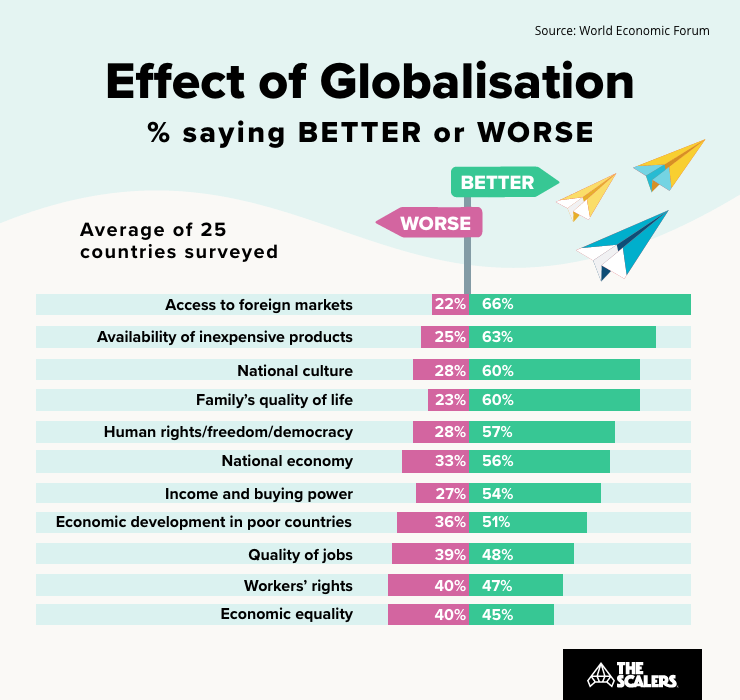When the concept of offshore development first started gaining popularity in the early 2000s, global businesses perceived it as the act of ‘taking advantage of cheap labour’. Almost two decades later, today, most organisations see offshoring for what it really is: an opportunity to extend their software development team with world-class talent.
However, on the flip side, some businesses are still concerned about the practical implications and ethics of offshoring. From job loss to low wages and low-quality output, the offshoring industry has been placed under a microscope for scrutiny. So, what are the ethics of offshoring in 2023 and beyond? Let’s dive deeper….
Why do companies go offshore?
Before a company decides to go the offshore route and build a distributed team, it’s essential to understand the benefits of offshoring.
1. Access to large talent pools
One of the primary reasons offshore development is gaining momentum is the sheer shortage of engineering talent in the West. In fact, according to ManpowerGroup, there will be a global shortage of over 545K software developers by 2026. In such a scenario, the reality is apparent — businesses in the West struggle to keep up with their hiring needs.
2. Cost-effective operations
Another challenge organisations in the West currently face is the need to stay cost-competitive. Let’s consider a company that is only operating in the UK. The cost of hiring talented engineers, their payroll, establishing R&D units, and delivering the finished software product or service requires massive capital — money that the business won’t generate if they only hire locally.
In these cases, going offshore can prove to be just the solution that businesses are looking for.

The ethics of working conditions
A common concern that correlates to the ethics of offshoring is quality. Some companies are still sceptical about software quality built by engineers in countries like India and the Philippines. However, the reality is quite different.
India produces over 1.5 million engineers every year, a number that is unrivalled across the globe. This means that finding talented, dedicated, and passionate engineers is much easier. Their premium education, never-say-never attitude, and grasping abilities ensure they only provide the best software. There are many reasons why software projects fail, but going offshore, if done strategically, is not one of them!
The second concern is working conditions. Fortunately, gone are the days when employees in developing countries like India were holed up in dingy cabins, working for 15 hours a day to meet deadlines. For instance, at The Scalers — one of the best offshore development companies — we’ve created anergonomic modern-day workspace designed to bolster the team’s morale, increase employee retention, and positively impact the company culture.
The ethics of patriotism
Another ethical question that arises when companies are looking to move their development processes offshore to another country is, “Am I depriving local engineers of jobs?”
The primary reason why companies are drawn towards the offshore development model is that they can scale quickly without compromising on quality. The fact that setting up a development centre in the West is very expensive, coupled with the statistical data that there just aren’t enough engineers, is why offshoring has become so popular. It definitely doesn’t lead to a loss of jobs, as one would think.

Rather than companies having to choose between globalisation or patriotism, why can’t they choose both? It has been proven, time and time again, that globalisation always benefits a country’s economy. Wealth is not a zero-sum game where one country’s loss is another country’s gain. If going offshore means becoming more economically productive and, in turn, producing better services and products, aren’t companies doing more good than harm?
What can you, as a business, do?
If the ethics of offshoring concerns you or your local employees, the best way to deal with it is to communicate with them. Your employees may wonder if the offshore team will eventually replace them, and rumours may fill the void if you don’t talk to them about it. Instead, be honest.
Ensure that your local team is aware of the long-term plans for your business, the roles and responsibilities of your offshore team, and what that means for everyone involved in the development processes. This way, you won’t face any ethical implications in the long run.
The ethics of wages
Other ethics of offshoring arguments are surrounded by engineers’ wages in countries like India surround other ethics of offshoring arguments. Because you can hire developers at a fraction of the cost compared to the West, businesses sometimes worry that maybe engineers aren’t being paid enough because they are either not as good or because the quality of work delivered is substandard.
However, their payroll is significantly cheaper because of India’s lower cost of living. For instance, consumer prices in the UK are over 219% higher than in India. Even groceries in the UK are priced 124% higher than in India. So, even if an offshore software development company in India can hire developers for anywhere between 25-40 €/hour, their disposable income is relatively high.
This means they are paid well, and businesses are not hiring cheaper labour and compromising quality. High prices don’t always mean high quality. By choosing the right offshore development company, you can gain access to developers who add value to your business without breaking the bank.

In summary
Today, the ethics of offshoring highlight its evolution from exploiting cheap labour to accessing global talent.
It emphasises dispelling misconceptions, fostering economic benefits, and transparent employee communication. Ethical offshoring ensures a positive integration of global talent for responsible and inclusive business growth.
Key takeaways:
-
1
Offshoring is driven by the need for access to large talent pools and cost-effective operations, addressing shortages in engineering talent in the West and the demand for cost competitiveness.
-
2
Concerns about working conditions in offshore development, particularly regarding software quality, are often unfounded, as countries like India produce many talented and dedicated engineers.
-
3
Modern offshore workspaces prioritise employee well-being, dispelling the notion of poor working conditions in developing countries.
-
4
Offshoring does not necessarily lead to job loss in the local market; it enables companies to scale quickly without compromising quality, benefiting both the global and local economies.
-
5
Open communication with local employees about long-term business plans and the roles of offshore teams helps address ethical concerns and fosters a positive work environment.
If you want to learn more about how offshoring can work for your business, please contact us by filling out the contact form below. One of our senior executives will get back to you shortly!
Build Your Team,
Not Just a Contract
With The Scalers’ offshore dedicated development team, you get engineers who join your workflow for the long run. Grow steadily, stay flexible, and work with people who care about the product as much as you do.










